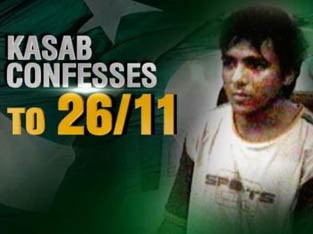By Mehak Budhrani
 Ajmal Kasab Confessed to the 26 11 Mumbai Terrorist Attacks |
This century, the word ‘K’ has dominated India in the arenas of Business, Government and especially Television. But only one ‘K’ shook India within hours – “Kasab”, the only surviving terrorist of 26/11. On the night of November 26, 2008 a war against India was waged which went on till the afternoon of November 29. Only Kasab was captured alive while the other nine terrorists were killed by the security forces. The Kasab trial went on for two years before a death sentence was passed to him on five counts of murder, conspiracy to murder, waging war against the country, abetting murder and indulging in terrorist activities, on the 6th of May, 2010. Kasab was also awarded life imprisonment on five other counts, which included attempt to murder, criminal conspiracy and violation of the Explosive Substances Act. Under the law, death sentence awarded to an accused by trial court comes up before the high court for confirmation. The High Court confirmed the order passed by the trial court on 21st February 2011.
Until the verdict was passed, during the two years, there was a huge uproar among the Indians which was justified. A national newspaper reported that “The cash-strapped Congress-led Democratic Front government in Maharashtra has been spending well over Rs 2 lakh a day on India’s priciest prisoner”.
(Ref: http://articles.economictimes.indiatimes.com/2010-05-05/news/27590949_1_arthur-road-jail-ajmal-kasab-jail-premises)
The Government of India gets money in the form of taxes paid by the citizens of India. The people were infuriated as to why their money was being spent for the protection and treatment of a perpetrator when there was enough evidence against him in the form of CCTV camera footage. The world witnessed the worst form of fear during 9/11. Osama did not go unpunished. He was brutally killed by the American Security Forces in Abbotabad, Pakistan. Don’t we wonder why Osama wasn’t given a chance to be tried by the American Jury? Then why is the Indian Government treating the Kasab issue so lightly? Shouldn’t he be dealt with in the same way the Americans dealt with their terrorist? But our Government claims that they are happy that Kasab was tried in a normal court of law and then given the death sentence. In a way, our democratic spirit is being enshrined.
Even though there was a sense of relief amongst the country and the families of those who were killed in the attack, when the death sentence was passed, there is another thought that confronts us. Do suicide bombers and terrorists really fear death? Kasab knew what he had come for and also knew his fate. Then will the death sentence create a sense of fear in his followers or will it make him a martyr? Surely such a subversive act must be punished in the most severe way. Special Public Prosecutor in the case, Ujjwal Nikam, opinionated that “Kasab is a killing machine and the manufacturing factory of such killing machines are still in Pakistan”. We all know that Kasab’s family was promised Rs 1.5 lakh for his sacrifice by the LeT. If such atrocious acts are awarded and such fanatics are treated as martyrs, then is a death penalty the right approach?
The passing of the death sentence opens up the following avenues for Kasab:
- Appeal to the Supreme Court.
- If the Supreme Court upholds the judgment of the High Court and the Lower Court, Kasab can file for a clemency plea to the President of India.
If Kasab files for a plea in the Supreme Court, and if the Supreme Court grants a life sentence, then will the Government spend some more money for the terrorist?
Capital Punishment in India is given in the rarest of rare cases. Currently, there are more than 100 people who have been awarded the death sentence but are in the queue to be executed.
Article 72 of the Indian Constitution gives the President the powers to reduce the sentence or grant a pardon to a convict, especially those involving capital punishment. According to the Ministry of Home Affairs, between 1995-2006, the President has rejected seven mercy petitions and commuted two, while between 1985 to 1994 it rejected 41 mercy petitions and commuted four. As many as 173 such petitions were received between 1975 to 1984 of which 121 were rejected and 52 commuted. However, a maximum of 543 mercy petitions were commuted between 1965 to 1974 during which 491 such petitions were rejected. According to Amnesty International figures at least 100 people in 2007, 40 in 2006, 77 in 2005, 23 in 2002, and 33 in 2001 were sentenced to death (but not yet executed). Looking at these figures, if Kasab is given an option to ask for mercy, how long will it be before he recompensates for his doings? The procedure for a clemecy plea (mercy petition) is long before final justice actually takes place.
The clemency plea could lead to:
- Grant of Pardon
- Rejection of Plea
This again would put Kasab in the queue before the other convicts are executed. This is now a political issue as we have to wait and watch if the Government of India executes this sentence expeditiously or will allow the queue system to continue.
The question to raise here is, is a death penalty or a life sentence enough for Kasab or should he be treated as mercilessly as he acted? Is this act of leniency on part of the Government of India assuring terrorists such as Kasab that they will be treated ordinarily and hence lead to recurring attacks? These issues are yet to be dealt with and answers awaited for. But the real issue which needs to be highlighted is that, is the death penalty really a deterrant for any terrorist?
(Mehak Budhrani is a Lawyer and Human Rights Activist)
Source: Chakra News
Also See
 |
Hindu Genocide in Kashmir & Bangladesh
Online photo exhibition of Hindu genocide and temples destruction in Kashmir by local Muslims. Series of exhibitions being arranged.
|
 |
Know more about Draconian Anti-Hindu ‘Communal Violence Bill’
Sonia Gandhi headed Un-constitutional NAC has drafted ‘Prevention of Communal & Targeted Violence Bill’ to destroy Constitutional rights of Hindus.
|
 |
Grave sins of Congress are driving India to doom!
Highest sins of the Congress which is taking the country to Hell and of all political parties who are doing nothing about it but just letting that happen !
|




